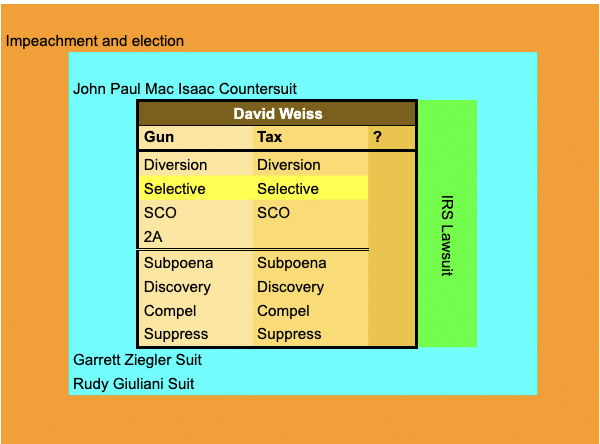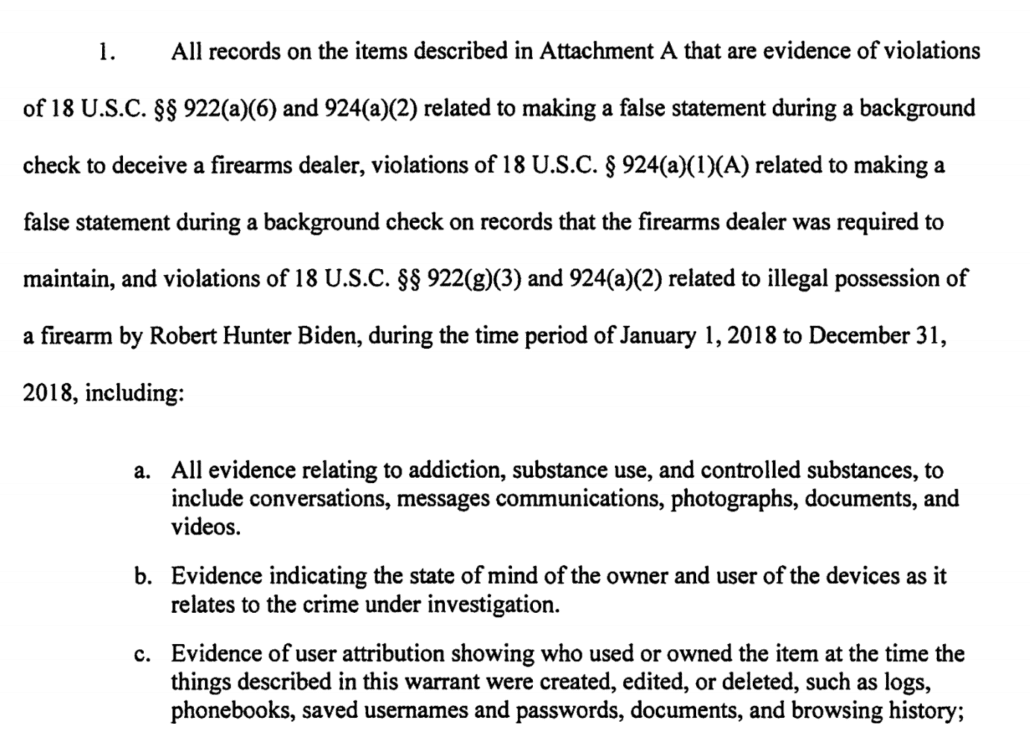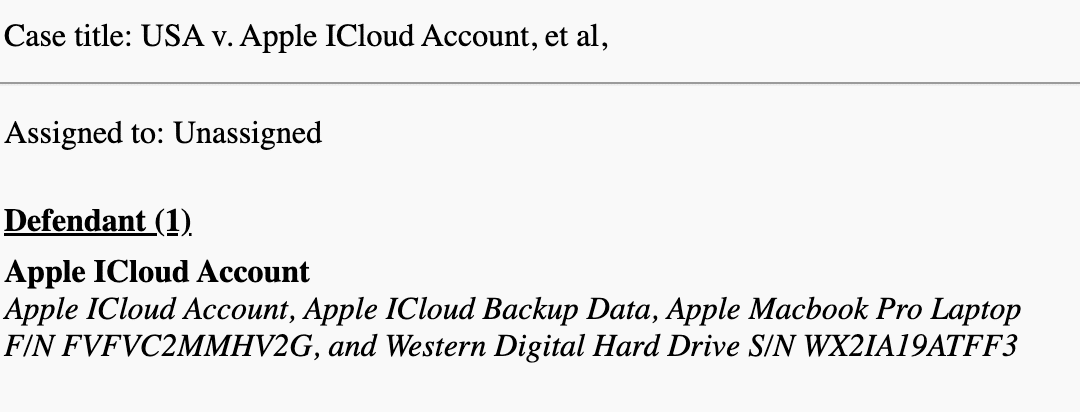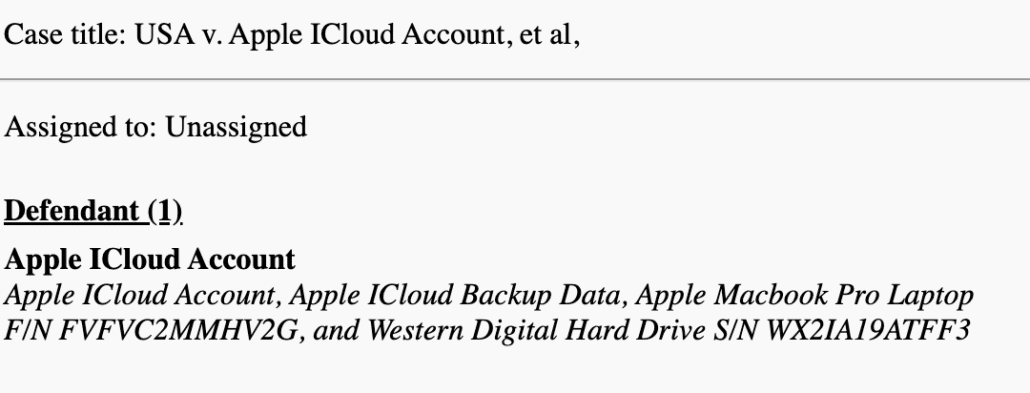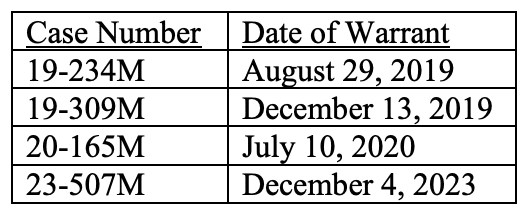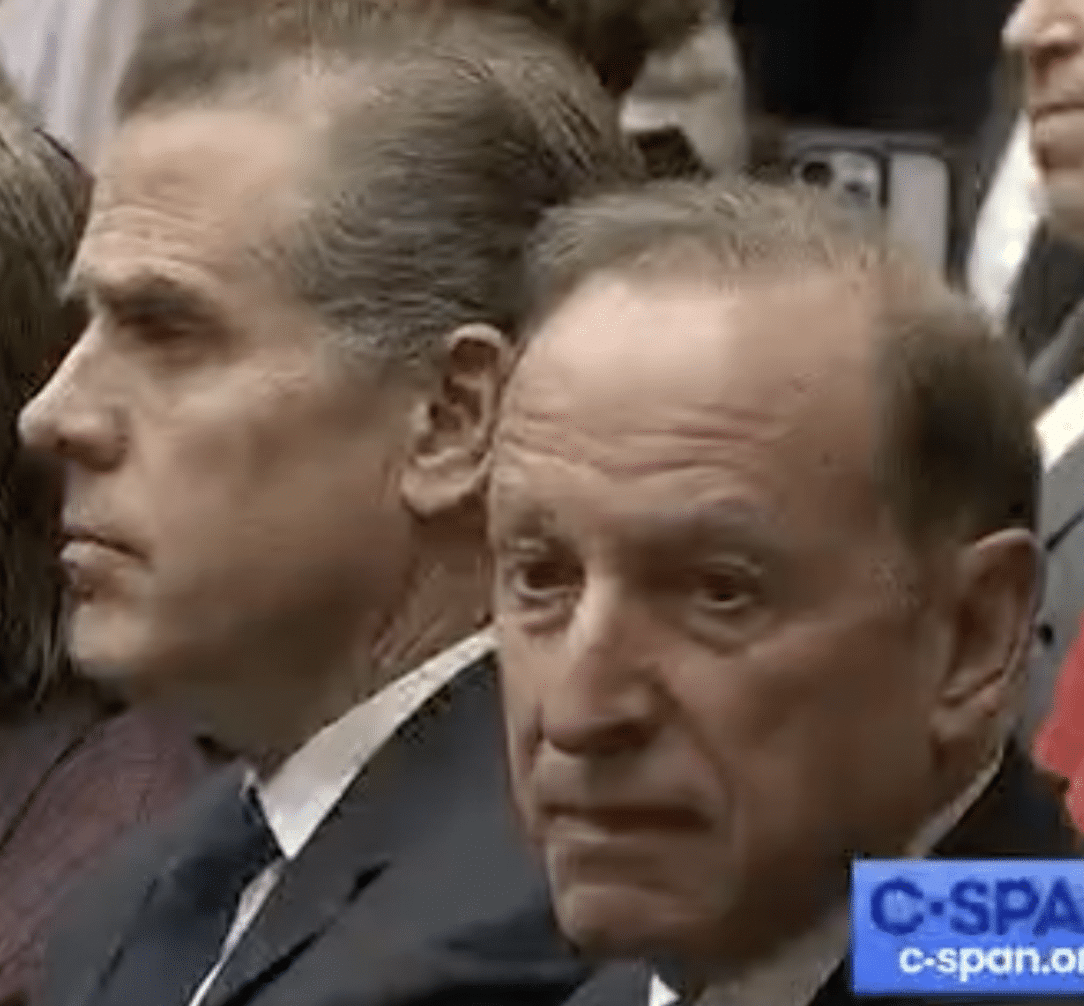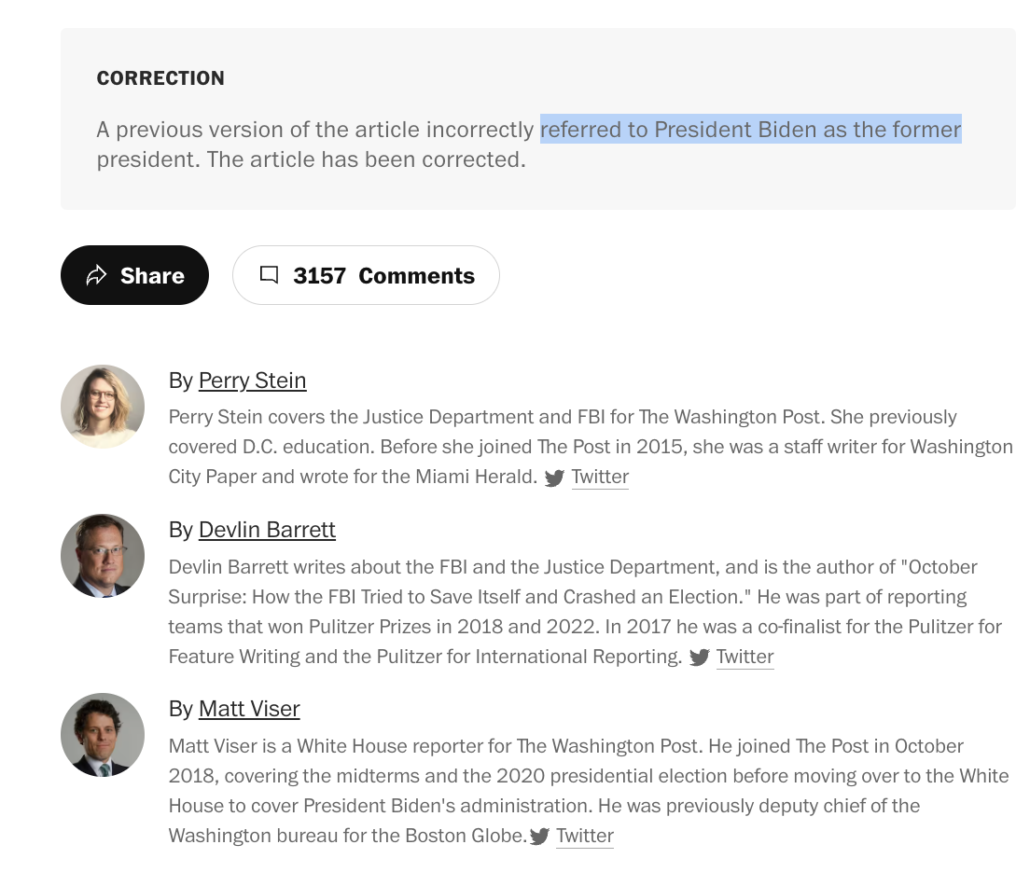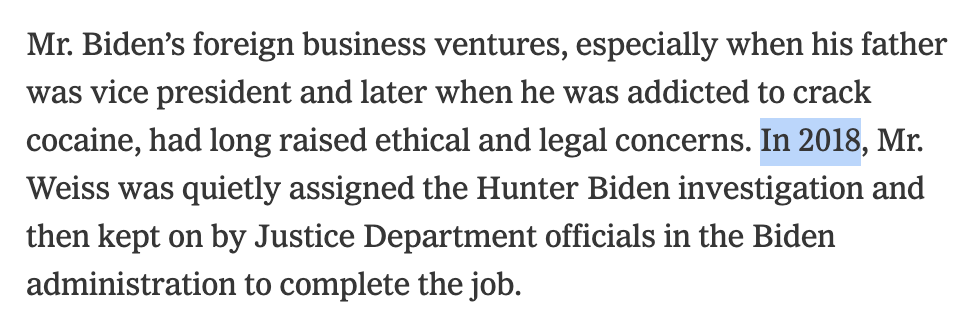Chessboard(s): Hunter Biden’s Replies
I’m going to write two posts on Hunter Biden’s reply motions in his gun case. Here are all the relevant filings:
Motions to dismiss
- Reply, Selective Prosecution; Weiss Selective Response; Selective motion
- Reply, Diversion Agreement; Weiss Diversion Response; Diversion motion
- Reply, 2A Constitional; Weiss 2A Response; 2A motion
- Reply, SCO Appointment; Weiss SCO Response; SCO motion
Information collection motions
- Reply, Subpoena; Weiss Subpoena Response; Subpoena motion
- Reply, Discovery; Weiss Discovery Response; Discovery motion
- Motion to compel
- Motions to suppress TBD
This post will address the point I made here: Abbe Lowell is managing eight different legal challenges for Hunter Biden that, with the exception of the Patrick Byrne defamation suit, all interrelate. He seems to be managing them to optimize timing and information collection.
This totally ugly illustration captures how I’ve begun to think of these (anyone remember Howard Johnson motels?).
The most immediate threat against Hunter Biden is the stuff in the middle: the threat of imprisonment in the (so far) twin prosecutions of him; I’ve included a column to allow for the possibility that David Weiss is still considering more. But that threat exists within — indeed, Lowell argues in his selective prosecution motion, was demanded — as part of the larger GOP impeachment and election effort. Lowell has responded to those threats with lawsuits — a countersuit against John Paul Mac Isaac, hacking lawsuits against Garrett Ziegler and Rudy Giuliani (all three are marked in blue), and a gross negligence lawsuit against the IRS (in green) — that will or may provide a second way of collecting information, outside the prosecutions.
For example, countersuing JPMI provided a way to get the data the blind computer repairman had shared with the FBI and the rest of the world, as well as to subpoena Apple (data obtained in discovery may parallel that subpoena). The judge in that case has stayed some nuisance subpoenas from JPMI targeting Hunter’s family, and dueling motions for summary judgement are all briefed for a hearing. If Lowell succeeds with his argument that JPMI violated Delaware law by snooping through a laptop the computer repairman claims was dropped off by Hunter Biden before sharing it with the FBI and the GOP, it would destabilize Weiss’ prosecutions (both of which, given the December warrant, build off it) and impeachment (in which the GOP has been relying on a hard drive they were withholding from Democrats). Not only did that countersuit make lawsuits against Rudy Giuliani and Garrett Ziegler possible, but if Lowell prevails, then those lawsuits will become a lot more precarious for the men who destroyed Hunter’s life if those suits survive a joint motion to dismiss hearing — largely based on venue and the applicability of Lowell’s hacking theory — in March.
That’s important background to the new motion to compel filed yesterday, which follows on two other efforts to gather information — a motion to subpoena Trump and others, and a motion for discovery. Among other things, that motion asks David Weiss to describe specifically where in the Apple data his team obtained the texts cited in his response to Hunter’s selective prosecution claim. As I alluded to yesterday, not only do the July 2020 warrants almost certainly build off the laptop in a way that Weiss seems to be trying to obscure, but the way in which and timing that devices were embedded within the laptop may pose some interesting legal problems for the government, particularly given that the warrants aspire to obtain attribution information that (thus far at least) Weiss’ team seems blissfully unconcerned with. While that same motion suggests it is seeking expert reports about the gun, if Weiss plans to rely on evidence obtained directly or indirectly from the laptop, he’s going to have to call the guy who, JPMI claims, was trying to boot it up before obtaining a warrant on December 9, 2019, as well as the “computer guy” who didn’t bother to check when files were added to the laptop for 10 months after receiving it, precisely the kind of attribution information that would be critical to actually admitting any of it as evidence.
Relatedly, Lowell has also promised a motion to suppress the laptop evidence.
The search warrant on December 4, 2023, which post-dates the firearm indictment by almost three months, is the first time in the course of this five-year investigation that DOJ obtained a warrant to search the alleged laptop (and iCloud account and backup data) for evidence of federal firearms violations. The prosecution then used that warrant to purportedly review and seize, for the first time, text messages, photos, and other evidence in support of its felony charges, several of which the prosecution cited in its pleadings on January 16, 2024. (See DE 68 at 8–9.) Moreover, that warrant contained testimony (in support of finding probable cause) about the firearm obtained from a witness in a grand jury empaneled in the Central District of California in November 2023 after this indictment had already been brought. Accordingly, the issue raised—as a result of the prosecution’s recent filings—is one to explore at the evidentiary hearing Mr. Biden requested (DE 64) and a motion to suppress which will be filed promptly.
Partly, this motion to suppress will be a complaint about Weiss’ post-indictment use of a California grand jury in this case (a complaint that, by itself, likely wouldn’t work). But there are other parts of even what I can see in the warrant that make it ripe for challenge. At the very least, defending a motion to suppress will force the government to commit to certain technical claims that, thus far at least, they appear to be dodging.
The motion to compel also asks Judge Noreika to get a commitment from Special Counsel that they have provided all Brady evidence. As it is, Weiss’ team is adhering to a far stingier discovery standard than Jack Smith is and Robert Mueller and the post-Mueller Mike Flynn challenge did. But there are things out there — the most notable of which is the Perfect Phone call between Donald Trump and Volodymyr Zelenskyy, the most important of which are the threats that David Weiss and his team received before he reneged on a plea deal — that Lowell likely can argue are solidly Brady which, from the sounds of things, Weiss has not provided. Lowell has, thus far, not called out Derek Hines for claiming it would take a Hollywood plot to explain how the political pressure ginned up by a guy who has elicited dangerous threats against every prosecutor and judge deemed to be adversarial to him might have led David Weiss to renege on a deal. Hines’ silence about those threats basically amounts to license, given by an AUSA, for stochastic terrorists to target all his AUSA colleagues. I’ve been puzzled that Lowell has never mentioned these threats — except in passing in the selective prosecution reply — but wonder whether Lowell is simply leaving it there for Weiss to fail to mention with the repercussions that will have on the case.
Litigating a motion to suppress and a motion to compel will also delay any trial in this case, assuming none of these motions to dismiss work. Those are not Lowell’s only bid for delay. In the reply challenging that the gun charges against him are unconstitutional, Lowell responded to Weiss’ optimism that SCOTUS will review other gun cases by bidding to stay the entire gun trial: “this Court should await that guidance from the Supreme Court before allowing this case to proceed to trial.” That’s probably not going to work, but Lowell’s Bruen-related challenge will ensure that Weiss can’t close up shop until the constitutional question is decided. More interestingly, given the tight schedule Judge Mark Scarsi has set in the Los Angeles case, with a trial scheduled for June, delays in Delaware (assuming the case is not dismissed) could have the effect of putting the tax case before the gun case.
As I’ll show in a post on the selective prosecution claim, such a claim may work better in the tax case than the gun one.
Potential delay may be one point of Lowell’s challenge to both the manner of David Weiss’ appointment as Special Counsel and his funding for it. In his reply, Lowell claims that Weiss has responded to the challenge by arguing that Weiss would have been able to prosecute Hunter as US Attorney for Delaware, so there’s no legal problem with doing so as Special Counsel.
In response to both the lack of authorization and lack of appropriation issues, the Special Counsel claims the Court should let him go ahead and prosecute this case in the wrong way because he believes he could find a right way to prosecute the case if he wanted to. Opp. at 20. With respect to his lack of authorization to bring the case as Special Counsel, Mr. Weiss claims that he could have brought the case in his capacity as U.S. Attorney even though he did not. Opp. at 22– 23 (conceding that he signed the indictment as “Special Counsel,” rather than bringing it in his capacity as U.S. Attorney). Perhaps Mr. Weiss could resign as U.S. Attorney and seek to be reappointed as Special Counsel, consistent with DOJ regulations, and then seek to indict Mr. Biden again. Perhaps he could find a way to prosecute this case with the costs and expenses of gathering new evidence that was not obtained in violation of the Appropriations Clause as well (see supra at 15). But such issues are premature as he has done none of those things. It is telling that Mr. Weiss’s last argument is that, if all else fails, he can put back on his U.S. Attorney hat, change the nameplate on his door, and start again
But that’s the point of the appropriations clause aspect of the challenge; Lowell argues that Weiss would have to go back and collect new evidence (testing the pouch the gun was found in for cocaine residue, getting new grand jury testimony, and getting a warrant to use laptop content for the gun crimes) without violating the appropriations clause. I don’t like this motion nor do I think it will work. But by making an appropriations clause challenge, Lowell may be able to enjoin certain things — like issuing a final report, replete as John Durham’s was with fabrications — until any appeals are exhausted.
Which brings me to the claim that the diversion agreement must be honored and the related discovery motion. Those are the arguments I’ve always thought stood the best chance (though the briefing on it has devolved into a squabble about language). In the body of the latter argument, Lowell notes that Weiss’ claims he was always considering charging Hunter doesn’t defeat Hunter’s claims, because he ultimately decided not to, before he changed his mind for no apparent reason.
The prosecution’s response to Mr. Biden’s motion to dismiss for selective and vindictive prosecution further confirms the need for discovery should the Court not dismiss the indictment outright. The prosecution claims that its reasons for charging this case were based on “overwhelming evidence” (DE 68 at 2, 24) it obtained in 2019 and 2021, and on the unexplained “deterrent effect” (DE 68 at 33, 40–41) that it claims this prosecution of Mr. Biden serves. And the prosecution suggests “it had been considering” charging Mr. Biden “long before plea negotiations began.” (DE 68 at 17, 40, 48.) But this explanation is entirely pretextual because— even with all these factors in play—the prosecution still determined that the appropriate resolution was a diversion on the gun charge and a probationary sentence on two tax misdemeanors. The prosecution even signed a Diversion Agreement and Plea Agreement to that effect, and openly advocated for the Court to adopt the Plea Agreement at the July 26, 2023 hearing. What the prosecution has not explained is why it deemed this agreed upon resolution of its issues with Mr. Biden appropriate on July 26, 2023, but chose to abandon that approach and charge Mr. Biden with multiple gun and tax felonies afterward. It is undisputed that extremist Republicans criticized the prosecution’s deal heavily, and since then, House Republicans have declared that pressure is what caused the prosecution to reverse course. The fact that the prosecution’s explanation for its charging decision does not explain why it chose to change its proposed resolution of the dispute does nothing to show those House Republicans are wrong to claim causing the prosecution to reverse course.
Then a completely predictable footnote notes that the efforts to collect new evidence after indicting raise more questions about Weiss’ claims than they answer.
1 The prosecution’s opposition briefs reveal some new evidentiary issues (e.g., seizing electronic evidence for the gun charges for the first time pursuant to a December 4, 2023 warrant; using a grand jury in California in connection with the tax case to elicit evidence for already-indicted gun charges in Delaware; seeking a search warrant in December 2023 to search for evidence in support of its charges three months after having charged; testing a leather pouch for cocaine residue in October 2023 that it had in its possession for five years; denying there was Probation’s approval for the diversion agreement) in addition to those raised in Mr. Biden’s motions to dismiss themselves (e.g., how a Delaware agreement for a diverted gun charge and two tax misdemeanors turned into multiple felonies in two jurisdictions following massive political pressure to do just that). Based on the prosecution’s admissions made only recently in its filings, Mr. Biden will expeditiously file a motion to suppress improperly gathered evidence.
This is what I pointed out: Admitting that you never sent the gun to the lab until weeks after indicting the case is a confession that you were never really going to prosecute it until Jim Jordan demanded you do so.
And the excuse offered in the filing — that an FBI agent first saw cocaine residue when taking a picture of the weapon — is debunked by the fact that Weiss received photos of the weapon in the case file he has had for years.
The prosecution produced a Delaware state police case file, which includes a summary of an interview Mr. Biden gave police in October 2018 and other information about the purchase, discard, and recovery of the firearm, as well as evidence photos from its case file. [my emphasis]
They didn’t need a new photo. They have photos! They needed evidence they didn’t bother to seek in the over five years since the gun was seized.
But all that comes against the background of three arguments about how and why the plea deal fell apart, something that Weiss has very assiduously avoided. In the diversion reply, Lowell argues that judicial estoppel prohibits Weiss from claiming the diversion agreement is not valid because Leo Wise stood before Judge Noreika and made assurances about the degree to which the diversion would protect Hunter’s rights. In the selective prosecution reply, Lowell reminds Judge Noreika that her concerns with the plea deal were not that it was not draconian enough, but rather, whether Hunter would be protected to the extent he understood he would be.
The Court did not accept the Plea Agreement that day, but the Court was clear: “I’m not saying I’m not going to reject the plea, I’m not saying I’m going to accept the Plea Agreement. I need more information.” (7/26/23 Tr. at 109.) The Court expressed no concern with whether the parties had struck a fair bargain, rather the concern the Court expressed to Mr. Biden was with “making sure that your plea gets you what you think it gets.” (Id. at 108.) The Court wanted assurances that the immunity provision in the Diversion Agreement that would have the Court decide whether Mr. Biden had breached his obligations under the Diversion and Plea Agreements before the prosecution could charge Mr. Biden with conduct that would otherwise be immunized was constitutional. (Id. at 105–06.) In other words, the Court’s concern was with making sure that Mr. Biden received the benefit of the bargain that he struck, not with changing that bargain to be more punitive against Mr. Biden.
At the end of that filing, Lowell describes how David Weiss sat in the back of Judge Noreika’s courtroom, watching Leo Wise advocate for measures (negotiated by Lesley Wolf before Wise was brought in) to protect Hunter.
On July 26, 2023, Mr. Weiss sat right behind his prosecution team when they urged this Court to accept those agreements.
As of today, the motion for a subpoena for Trump has been fully briefed for 50 days, but Judge Noreika has not addressed it.
Indeed, the only thing we’ve heard from Judge Noreika since she granted Lowell’s request for a delay to do all this briefing on October 19 was her order granting my request to unseal the Apple warrants in this case (And thanks to Judge Noreika and her courtroom deputy and the clerks who scrambled to make it possible for doing so). That is, it’s not clear yet what she makes of these competing arguments.
But it is absolutely the case that Leo Wise stood before her and made certain representations about the plea deal. And my impression at least accords with Lowell’s: that her concerns arose from protecting Hunter Biden’s rights, not granting Jim Jordan the head of the President’s son.
Judge Noreika could just rule that the diversion agreement is binding (which as noted in my ugly table, will have interesting repercussions for the LA case). She could order an evidentiary hearing, granting the long-briefed motion for subpoenas.
Based on reports, in the initial appearance in the LA case, Judge Scarsi implied he’d be cautious against granting discovery about deliberations (presumably including the recommendation Los Angeles US Attorney Martin Estrada’s top prosecutors made about problems with the case). But he sounded more amenable to discovery about other topics — possibly the threats that Derek Hines treats as a Hollywood plot, including threats targeting Estrada.
In three weeks, Abbe Lowell will file most of these same motions before Scarsi, and if any work — especially the selective prosecution one — it might make the Delaware one unsustaintable as well.
Again, I’m not saying these will work. Selective prosecution has been made all but impossible to argue, for example.
But I am saying that Lowell is increasing his chances for success.

